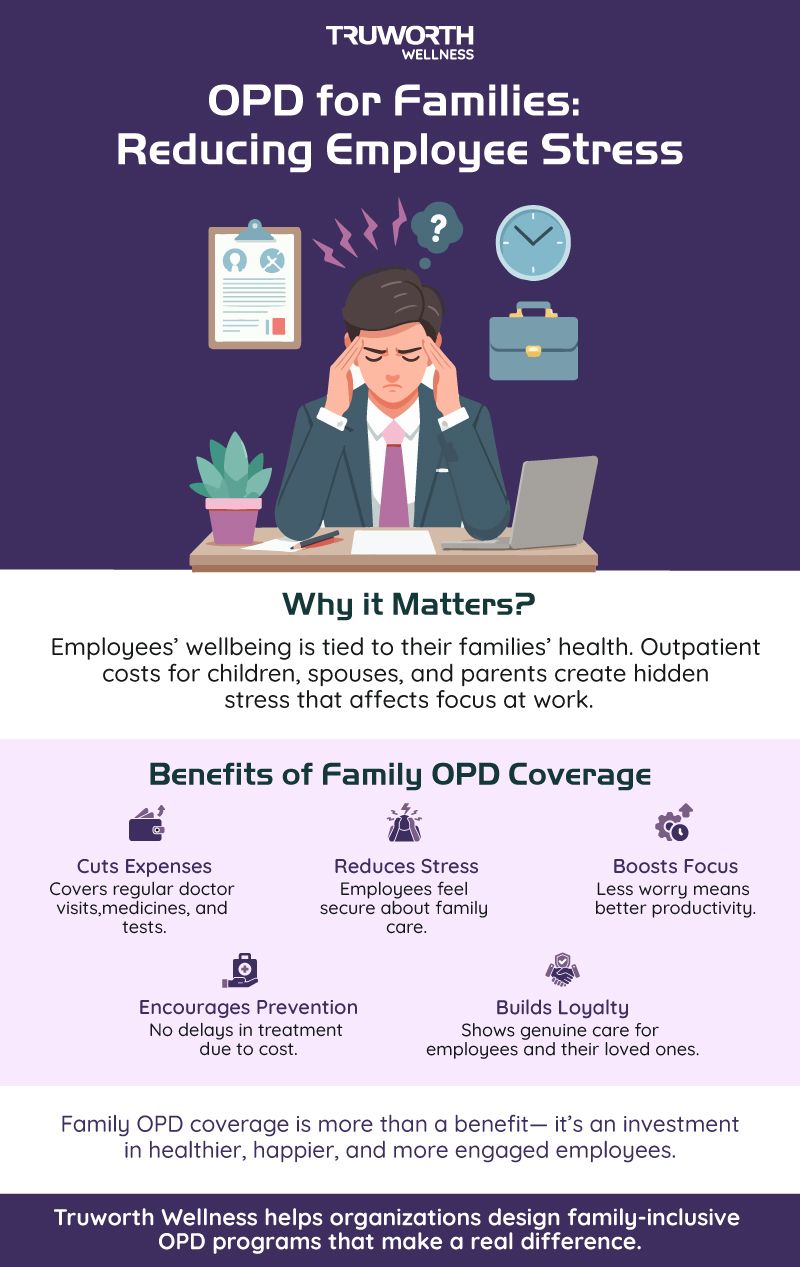OPD For Families: Why Covering Dependents Reduces Employee Stress?

When we think of employee wellness, conversations often stop at individual benefits like gym memberships, annual checkups, or hospitalization coverage. What we miss is a simple truth: employees are not just individuals at work, they are also parents, spouses, and children at home. Their personal and professional worlds are deeply connected, and their performance at work is influenced by how secure they feel about their family’s health.
One of the most effective yet overlooked ways to reduce employee stress is by offering OPD (Outpatient Department) coverage not just to employees but also to their dependents. For Indian employees, this single step can be life-changing. Families here often rely on one or two earning members, and when dependents require frequent medical care, the financial and emotional burden falls directly on them. A child’s recurring consultations, an elderly parent’s diagnostic tests, or a spouse’s regular treatment can add up quickly, leaving employees juggling expenses while struggling to focus at work. Extending OPD coverage to families addresses this hidden challenge and builds a culture of real support.

The Invisible Pressure of Outpatient Expenses
Hospitalization is something that people may experience once in a while, but outpatient visits are an everyday reality. A family’s healthcare budget often goes into routine doctor consultations, medicines, and tests. While hospitalization is covered under traditional health insurance, outpatient care rarely is, which means employees are forced to pay out of pocket for these recurring expenses.
Imagine an employee who earns well but spends a significant portion of their salary on their father’s monthly diabetes checkups and their child’s frequent pediatric visits. Even if these are manageable amounts individually, collectively they add up to a major financial strain. Over time, this constant outflow creates stress and anxiety. The worry is not just about money but also about managing appointments, taking leaves, and ensuring their loved ones get timely treatment. This is the kind of stress that does not show up in HR dashboards but quietly eats into productivity.
Why Family Health Matters at Work?
For most employees, family comes first. No matter how engaging or supportive the workplace is, an employee will struggle to perform if their loved ones are unwell or if they are worried about affording their care. By extending OPD coverage to dependents, organizations send a powerful message: “We value you not just as an employee but as a person with responsibilities.”
This shift from individual to family-centric benefits makes a tangible difference. Employees begin to feel that their employer genuinely understands their lives beyond office walls. In a country like India, where multi-generational households are common, this type of support directly reduces workplace stress and creates stronger bonds of loyalty. Employees who know their families are covered are less distracted, less anxious, and more committed to their work.
Also Read: The Role Of OPD Wellness Programs In Employee Health And Company Success
The Productivity Ripple Effect
Stress is contagious, and family-related worries can easily spill into professional life. When employees spend mental energy thinking about medical bills or arranging last-minute consultations, their focus naturally suffers. On the other hand, when they know their spouse’s dental consultation, their child’s vaccination, or their parent’s blood test is already taken care of under a company-supported plan, they can work with peace of mind.
This peace of mind leads to fewer unplanned leaves, higher concentration, and improved mental health. Over the long run, it also supports preventive healthcare. Families are less likely to delay treatment due to cost concerns, which means small issues are treated early before they escalate into serious conditions. For employers, this translates into lower long-term healthcare expenses and higher overall productivity.
Closing the Gap in Traditional Insurance
Most organizations already provide health insurance to employees, but these policies are often hospitalization-focused. They don’t address the day-to-day healthcare needs that families encounter far more often. Surveys show that outpatient expenses account for a significant share of household medical spending in India, sometimes even more than hospital bills.
By covering dependents under OPD, employers close this gap between what insurance provides and what employees actually need. Benefits are meaningful only if employees can use them in their daily lives. A hospitalization-only plan may look impressive on paper, but an OPD-inclusive plan for families is the kind of support that employees truly value because it meets their real needs.
Also Read: Insurance V/S Comprehensive Wellness Programs for Employee Well-being
A Case in Point
Consider an employee who lives in a joint family with parents and two young children. Every month, the parents need consultations for chronic conditions, and the children frequently visit doctors for seasonal infections. Without OPD coverage, this employee spends thousands out of pocket every month, leading to financial stress and emotional fatigue. When the employer extends OPD benefits to the whole family, the burden eases significantly. The employee no longer worries about postponing appointments due to costs, and instead, the family gets timely care. The organization benefits too, because the employee comes to work less stressed and more focused.
The Mental Health Connection
Family-related financial stress is one of the leading causes of anxiety for working professionals. When employees constantly worry about paying for dependents’ medical needs, it creates a cycle of mental strain that can lead to burnout. By providing OPD coverage to families, organizations take proactive steps to reduce this anxiety.
Employees feel reassured that they do not have to compromise between their work responsibilities and their family’s health. This reassurance has a direct impact on mental well-being. It helps employees maintain balance, lowers stress hormones, and allows them to stay motivated at work. In the long term, it also contributes to a healthier organizational culture where people feel cared for and understood.
Also Read: Staying Committed To Your OPD Wellness Program
Why Employers Should See It as an Investment?
Some employers hesitate to extend OPD benefits to families, viewing it as an additional cost. But in reality, it is an investment with high returns. Reduced absenteeism, lower turnover, higher engagement, and improved employer branding are all tangible outcomes of family-inclusive healthcare. Employees who feel supported are more loyal, and in competitive industries, this loyalty can be a game-changer.
Moreover, family OPD plans promote preventive care, which reduces the likelihood of serious illnesses that require expensive hospitalization later. By spending a little more upfront on outpatient benefits, organizations can actually lower overall healthcare expenses in the long run.
Looking Ahead: The Future of Employee Wellness in India
The modern workforce expects more personalized and relevant benefits. Younger employees value family-friendly policies as much as salary hikes, while mid-career professionals prioritize healthcare for their children and aging parents. As organizations compete for talent, offering family-inclusive OPD coverage will soon shift from being a differentiator to becoming a necessity.
Forward-thinking companies have already started moving in this direction. They recognize that true wellness cannot be achieved if an employee’s family is left out of the equation. By leading with empathy and aligning benefits with real-world needs, these companies are setting new benchmarks for employee wellbeing.
Final Thought
Extending OPD coverage to families is more than a healthcare perk. It is a statement that the organization cares about its employees as people, not just professionals. It reduces hidden stress, strengthens emotional bonds, and directly boosts productivity. Employees who know their families are secure work with more focus, greater peace of mind, and deeper loyalty.
If organizations want to build healthier, happier, and more engaged teams, family-inclusive OPD benefits are the way forward.
Truworth Wellness helps companies design OPD plans that go beyond the individual and cover what truly matters—families. Reach out to us to explore how you can build a culture of care and reduce employee stress through thoughtful healthcare programs.